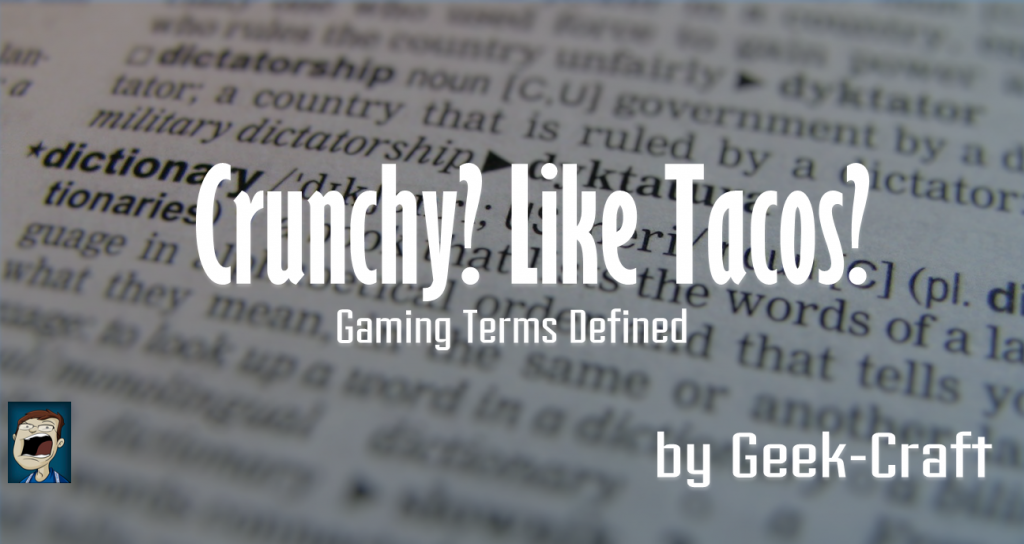Crunchy? Like Tacos? – Gaming Terms Defined
As with any hobby, there can be a lot of jargon that is thrown around that makes sense if you’re in the know, but can scare people who don’t know what you’re talking about away. As someone who welcomes everyone to my gaming table and to explore boardgaming as a hobby, I thought I’d help define some terms that are thrown around. These are not meant as an end-all source for terms, as some of them are vague at best, but it’s a start.

Some of these terms will refer to each other, so I’ve grouped them based on those connections rather than in full alphabetical order. These are also going to be how I use the words, which may not be how everyone uses them. I’ve also included examples for most of the terms that cover games.
Abstract – An abstract game is one that usually is very strategic and not luck based, but the theme is very thin or non-existent. For example, we all know that in Chess, there’s a King and a Queen, but there’s no story behind it. Checkers has no narrative, but it’s still a fine game.
Ameritrash / Euro / Hybrid – In most games, there are elements of luck, strategy, and theme. In most cases a game that is an American style game, sometimes referred to as Ameritrash, has a high luck factor, often allowing players to directly interact with each other, and is rich in theme. These games may not offer deep strategy or long-term planning, but they can offer great stories and lots of raucous laughter. A Euro game, on the other hand, is one where there is little to no luck, less player interaction (especially direct conflict), and usually less focus on theme. These games provide a strategic experience with lots of thinking and consideration. A Hybrid game combines elements of both, including luck and strategy and ways of mitigating the luck to ensure a plan has the potential to pay off. Betrayal at the House on the Hill is my favorite Ameritrash style of game. Agricola is a great example of a Euro game. Eclipse is in between as a Hybrid game.
Analysis Paralysis – Games with many decisions and long-term impact of those decisions, a player can have many options on their turn. This can result in a player thinking and planning but being unable to reach a definitive best course of action. Players may experience Analysis Paralysis, commonly called AP, when trying to maximize the benefit of their turn.
Campaign / Legacy / Resettable Legacy – In some games, there is not only a story set up for an individual play, but across multiple plays. These are often called Campaign or Legacy games, where players make decisions that impact all future games. Legacy games also usually have a permanence to the decisions, such as applying stickers or destroying components. A Resettable Legacy game is one where the decisions impact later games, but the game can be reset afterward without needing to buy another copy. Think of these like Choose Your Own Adventure style books – you never rip out any pages, but if you make a bad decision or want to try again, you can do so easily. These games are usually very rich in story, but have a downside of the replayability being diminished. For example, once you’ve seen Fight Club, watching it again isn’t the same as the first time because you know the twist. There can be other decisions to make, which may impact the outcome, but these are normally not vastly different from the initial playthrough. Arkham Horror: The Card Game is my favorite Campaign / Resettable Legacy game. Pandemic Legacy: Season 1 is one of the best examples of a Legacy game.
Chrome – Games can have very simple and inexpensive components. They can also have very detailed and complex pieces, which may increase the cost of a game, but also make the world more immersive. A game that has a lot of chrome has detailed and interesting pieces and not simple wooden cubes or cardboard pieces. While they may be more visually appealing, they are not any more functional than their less deluxe counterparts. Victorian Masterminds is a game with a ton of Chrome.
Collectible Card Game / Living Card Game – Collectible card games are ones where a player normally buys packs of cards that are randomized and builds a deck out of those random cards. There are usually a lot of options for what the cards can do and it’s up to the player to figure out how to best work with those cards. These can get expensive if a player is after a particularly rare card. The term Living Card Game is a trademark owned by Fantasy Flight Games, but there are other companies that do similarly styled products. In these games, players still buy cards, but there is no randomness to the purchase; buying a particular product will result in the same cards for everyone, meaning there is no rarity. These are often done with regular updates, which means a lot of cards to buy and what ends up feeling like a subscription cost. Magic: The Gathering and Pokémon Trading Card Game are both Collectible Card Games. Ashes: Rise of the Phoenixborn is an example of a Living Card Game style of game.
Crunchy / Heavy / Filler / Light – A crunchy game is not one that you eat. Rather, it is one with many available decisions and offers lots of planning. There is usually an element of rewarding strategic planning, but also an aspect of risk and reward. There is also a larger math aspect to the game play. Similarly, a Heavy game does not refer to the physical weight of the game, but the impact of the decisions the players can make. They are also often longer games, sometimes taking upwards of two hours. On the opposite site of the spectrum is a Filler game, which are very quick games, usually taking 30 minutes or less. These are also usually very light, which again does not refer to actual weight, but to the nature of the game play. Usually these games are very simple and appropriate for all ages. Teotihuacan: City of Gods is a Crunchy and Heavy game. Love Letter is a great light, filler game.
Deck Building / Deck Construction – A Deck Building game is one where through the process of playing the game, players add card to their deck as a part of the game play. Dominion and Ascension are likely the most notable examples. Within the genre of Deck Building games, there are generally two types. Dominion style deck building games have multiple stacks of cards where each card in the stack is the same but the cards available are changed from game to game. These offer consistent options for the players, but can result in strategies that perform better than others, so the game can feel stale over time. Ascension style deck building games have a large variety of cards all shuffled together and some number of cards are revealed from the top of the stack, creating a more randomized set of options. These kinds offer a large variety of cards, but if certain cards don’t come up, the strategy a player wants to use may not work well. Each kind of deck building game has its pros and cons. A Deck Construction game, on the other hand, is generally either a Collectible Card Game or a Living Card Game where players construct their decks outside of the playing of the game and then bring them together to play the game. The most popular version of this would be Magic the Gathering, but there are many other similar games.
Dice Chucker / Dice Fest – Games described as either of these tend to have many dice that a player will roll all at once. This isn’t inherently a bad thing, but players who don’t want a large luck element may want to be cautious. King of Tokyo is an example of a Dice Chucker.
Elegant – A game that is elegant has a set of rules that fit nicely with the components and gameplay. For example, that a bishop in chess can move only diagonally isn’t something that makes sense in the real world, it’s just a part of the game. Elegant games usually have shorter rules. The complexity of the game comes from the decision-making, not from understanding the rules. Elegant games also usually have very few rules exceptions. Carcassonne is a great example of an Elegant game.
Fiddly – A Fiddly game has many components, often small ones, that have specific locations or orientations that matter to game play. This can also cover games where there are many components that have to be physically moved frequently. One good bump of the table can ruin a game that is too fiddly. Terraforming Mars is a fiddly game.
FLGS – Your Friendly Local Game Store (or FLGS) can be a great place to learn about board games, try games out, meet other people who enjoy playing games, and hopefully act as a welcoming environment. My FLGS is Critical Hit Games in Cleveland Heights, OH.
Gateway Game / Hobby Level Game / Mass Market Game – A Gateway Game is one that is easy to learn, easy to teach, and is very approachable to someone who has never heard of the games sold at an FLGS. A Hobby Level Game is one that is usually sold at an FLGS and not at large chain stores, such as Wal-Mart or Target. That being said, those stores have been expanding their board game sections over the last few years. A Mass Market Game is one that is sold at many different kinds of stores and is one that everybody has played, such as Monopoly or Uno. These aren’t necessarily bad games, but there are people in the hobby who look down on Mass Market games. Kingdomino is a great Gateway Game, while Tiny Towns is a Hobby Level Game.
Joe – As borrowed from some gaming friends, someone who “Joes a rule” manages to miss a small but significant rule in a game that strongly impacts the actual gameplay. For example, in Can’t Stop, if you don’t realize that you can work across all eleven columns during the game, but only three on a given turn, that’s a Joed rule. Note that this may be a different term depending on your game group. For some, this may be a Zach or John.
Kingmaker – In a game where there are multiple players and ways to earn points, a Kingmaker is someone who usually isn’t in contention to win the game, but can directly impact who does win the game. This practice is generally frowned upon, but isn’t an uncommon aspect of gaming.
Meeple – Meeples are small, typically wooden pieces that are components in a board game. They originally were shaped like people, as in Carcassonne, but the definition has expanded to include animals, vehicles, and resources. They are sometimes just solid colors, or occasionally have printing on them.
Muggle – Taken from the world of Harry Potter, a Muggle in gaming terms is someone who has no exposure to the world of games that exist outside of Mass Market games. This should not be taken as an insult, but rather a note of one’s unawareness.
Point Salad – If a game has a large variety of ways to score a wide variety of points, it can be referred to as a Point Salad game. Frequently this also implies that when faced with a decision, most of the options will be roughly equally valid for purposes of earning points. The Castles of Burgundy is one of the most famous examples of this style of game.
Quarterbacking – In a cooperative game, some players may find that they “know best” and analyze the situation in the game and figure out what is best for all the players to do on their turns. This turns a cooperative game into a solitaire game with the non-quarterbacking players acting as pawns for that player. Players who quarterback can severely reduce the amount of fun that the other players can have playing a game. Pandemic is a game that can suffer from Quarterbacking.
Roll and Write – In a roll and write game, players will usually use dice to determine a randomized outcome and pencils to write on their own score pads. These games offer a large variety of options, as they do not have to worry about components as much as other games. Sometimes instead of rolling dice, cards are used. Sometimes drawings are used instead of writing numbers. Yahtzee is likely the most well known roll and write game, and a more Hobby Level example would be Roll Through the Ages: The Bronze Age.
Rules Lawyer – When someone knows a game very well, and is able to cite the rules without having to reference a rulebook, they may be seen as a Rules Lawyer. Knowing a game very well may allow you to run events for it and the rules knowledge you have may be a great resource. However, sometimes this can also have a negative connotation where a player intends to play by the rules as written instead of as intended. For a real world example, if you asked me to go to the store and get you a piece of fruit and I came back with a tomato, I would technically be right, but clearly misconstrued what was intended.
There are a lot of terms in this hobby that can confuse people. If you hear a term that you aren’t familiar with, ask what it means. Do you know of any others? I’d love to add them to this post.





